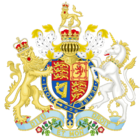Canada Corn Act 1843 facts for kids
| Act of Parliament | |

|
|
| Citation | 6 & 7 Vict. c. 29 |
|---|---|
The Canada Corn Act was a law passed in 1843 by the British Parliament. It allowed grain from Canada to be sold in Britain with much lower taxes. This law was later cancelled in 1846.
Contents
History of the Canada Corn Act
Why the Act Was Needed
Before 1843, Britain had a law called the Importation Act 1815, also known as the Corn Law. This law made it hard to bring grain into Britain. Even though Canada was part of the British Empire, its grain faced these strict rules. This made it difficult for Canadian farmers to sell their crops in Britain.
How the Act Changed Things
The Canada Corn Act was created in 1843 to help grain farmers in Upper Canada. It greatly reduced the tax on Canadian wheat imported into Britain. The tax became very small, just 1 shilling for every quarter of grain.
This lower tax made it much cheaper to ship grain through the St. Lawrence River. To get more shipping business, the American government also helped. They allowed Canadian grain heading for Britain to pass through the Erie Canal without extra taxes.
The Act also let Britain import Canadian grain, whether it was raw or already processed. This led to a new trade: American grain was sent to Canada to be milled into flour. Then, this flour was shipped to Britain. This gave a big boost to Canada's flour-milling industry.
Why the Act Was Cancelled
The benefits of the Canada Corn Act did not last long. British Prime Minister Sir Robert Peel wanted Britain to have "free trade." This meant fewer taxes on goods coming into the country.
A big reason for this change was the Great Famine in Ireland. Many people were starving, and Britain needed cheap food quickly. So, in 1846, the Canada Corn Act was cancelled.
At the time, many Canadians felt this was a bad decision for them. The Act had given Canada a special advantage within the British Empire. Historians still discuss how much the cancellation really affected Canada's grain exports in the years that followed.
See also
Sources
- Canada Corn Act
 | Calvin Brent |
 | Walter T. Bailey |
 | Martha Cassell Thompson |
 | Alberta Jeannette Cassell |

